

Democracy and Illiteracy Do Not Move Together

- Abeera Fatima
- August 15, 2023
- CSS , CSS Solved Essays
- 38361 Views
CSS 2019 Solved Essay | Democracy and Illiteracy Do Not Move Together
Abeera Fatima, a student of Sir Syed Kazim Ali, has attempted the CSS 2019 essay “ Democracy and Illiteracy Do Not Move Together ” on the given pattern, which Sir Syed Kazim Ali teaches his students. Sir Syed Kazim Ali has been Pakistan’s top English writing and CSS, PMS essay and precis coach with the highest success rate of his students. The essay is uploaded to help other competitive aspirants learn and practice essay writing techniques and patterns to qualify for the essay paper.

1- Introduction
2- Relationship between Democracy and Illiteracy
- Understanding democracy
- Understanding illiteracy
- Inverse correlation between democracy and illiteracy
3- Facts Highlighting That Democracy and Illiteracy Do Not Move Together
- Case in point: 2020 Belarusian presidential election
- Case in point: use of propaganda on social media; hybrid warfare
- Case in point: lack of youth bulge in the political arena of Pakistan
- Case in point: a comparative analysis of parliamentary and presidential forms of government
- Case in point: derailment of democracy in Pakistan – 1958, 1977, and 1999
- Case in point: Monarchy in the Middle East
- Case in point: a comparative analysis of corruption in developed and developing countries
- Case in point: Mukhtiyara Mai and Malala YousafZai
- Case in point: contemporary situation of Afghanistan after the evacuation of the US
- Case in point: comparison of literacy rate among males and females in Pakistan
- Case in point: Arab Spring 2011 and leaders in the Middle East
- Case in point: fraud loan apps in Pakistan
4- Factors Responsible for the Prevalence of Illiteracy
- Flawed governmental policies
- Lack of budgets for the spread of education
- A vicious cycle of poverty and backwardness
- Increased population growth and a callous approach of religious leaders
- Absence of women’s participation and social barriers
- Ineffective role of media
- Lack of technological advancement
5- Some Steps Already Taken for the Provision of Democracy across the Globe
- Millennium Development Goals (MDGs) and Sustainable Development Goals (SDGs)
- Democracy Summit 2023
6- Recommendations for Strengthening Democratic Norms in True Letter and Spirit
- Professionally mature and highly responsible role of media
- Ensuring judiciary independence to curb institutional involvement
- Scrupulous policies for population control
- Proper implementation of poverty alleviation programs
- Awareness campaign for the eradication of social and cultural barriers
- Allocation of a proper budget for the provision of education
7- Conclusion

Democracy, irrefutably, incorporates three main features active participation of citizens, an independent judiciary, and a free media. All these features are highly dependent on the literacy of the common man. Norway, for instance, being a Scandinavian country, has a high literacy rate of 100 percent, which results in the successful implementation of democratic norms in the country. Thus, democracy and illiteracy do not move hand in hand; the existence of the latter is the death of the former. A myriad of testimonies are cited in the account: decreases voter turnout rate; creates a vacuum for dictatorship; rises misogynistic customs and traditions vis-à-vis women’s participation; enhances manipulation and exploitation of the citizens; and results in the rise of misinformation and propaganda. However, a couple of factors are highly responsible for the presence of illiteracy, for example, flawed governmental policies, lack of budgets for the spread of education, a vicious cycle of poverty and backwardness, and dynastic politics and authoritarian regimes. Yet, some pragmatic and viable remedial measures are the need of the hour.
Democracy and illiteracy can be defined in several ways. Democracy is of the people, by the people, and for the people, as aptly stated by Abraham Lincoln. However, democracy is considered to be the best form of government, owing to its silent features of citizens’ engagement in political, social, and economic paradigms. On the other hand, illiteracy is the quality or condition of being unable to read or writes. It is a multifaceted menace that swallows the country not only politically but also socio-economically. Nevertheless, the correlation between democracy and illiteracy is inversely proportional. The nurturing of the former is the graveyard of the latter.
After a bird’s eye view of the terms, it is immensely important to shed light on the facts which prove that democracy and illiteracy cannot dance together on the ramp. To start with, illiteracy decreases the voter turnout rate, which impediments democratic norms and values. It is due to the lack of trust in the electoral process and the perception that the election can never be held free and fair in the country. In 2020 the Presidential election of Belarus, for instance, the winner was declared with 80 percent of the vote. It was declared the most corrupt election in Europe. The then government did several malpractices, such as restriction the participation of the opposition candidates, horse trading, censoring the media, and such forth. Thus, the voter turn-out rate decreases to 84 percent, according to Al Jazeera.
Similarly, a rise of misinformation and propaganda is the outcome of the illiterate society. The most eminent tool of the 21 st century is social media- WhatsApp, Facebook, Meta, Twitter – to manipulate the minds and hearts of the stakeholders of the community. The phenomenon is popularly known as fifth-generation or hybrid warfare; the third party or state funds the propaganda of spreading hate speech, leading to violence and unrest in the region. Thus, it has direct implications for the functioning of democracy and good governance. To illustrate, Nigeria, Pakistan, and Ethiopia have 60 percent, 60 percent, and 50 percent literacy rates simultaneously is to be quoted in this regard.
In addition to this, illiteracy shrinks the political participation of billions of active and engaged citizens. A couple of barriers are in the way of the people: natural disasters, outbreaks of deadly diseases, economic crises, and such forth. Thus, people start losing interest in political ideas and ideology and perfectly declare the way it is going on. To exemplify the youth bulge of Pakistan, having 60 percent of the population under the age of 25, much young Pakistani lack interest. One of the reasons is the absence of the students’ union in the august institutions in the contemporary era. According to the Global Campaign for Education, almost 774 million young populations around the world cannot read and write.
Next to it, illiteracy creates a vacuum for dictatorship and coups. Historically, particularly in Germany, Europe was under the hands of dictators for several years, having devastating impacts all over the world; Hitler in the Second World War. It is popularly said that the seed of the Second World War is sowed in the First World War. After the industrial revolution, the roots of democracy get strong in Europe. However, the Third World countries, like Pakistan, have had derailment of democracy. General Ayub Khan 1958, General Zia-ul-Haq 1977, and General Musharraf 1999 declared Martial Law which was justified under the doctrine of necessity. All these coups murdered the evergreen democracy of the people: the suppression of civil liberties and the arrest of political leaders created a cycle of political instability and uncertainty. As aptly stated by Albert Moravia,
“Dictatorships are one-way streets; Democracy boasts two-way traffic.”
In the same manner, illiteracy increases dynastic politics and political polarization in the country. Dynastic politics is a novel terminology in the state behaviour theory; it is the politics of generation to generation. In simple words, political affairs are concentrated in the hands of a few. However, a real-time example of dynastic politics is delved into the Kingdom of Saudi Arabia, Qatar, Oman, the United Arab Emirates, Pakistan, Thailand, and many more. The majority of these countries are under the rule of Kingship, another form of government. Had monarchy not prevailed in the region, the situation of illiteracy would never have been worst.
Likewise, illiteracy multiplies the acts of malpractice, owing to a lack of transparency and accountability, in all the realms of the community. Acts of malpractices like corruption, embezzlement, bribery, and fraud become common in such a society; nevertheless, these elements are high in developing countries rather than in developed countries. According to the Corruption Index Perception 2020 by Transparency International, developing countries are prone to higher levels of corruption as compared to developed countries. According to the same report, developed countries, with the top 10 least countries, are less indulge in corrupt practices; while developing countries like Somalia, Sudan, and Syria ranked as the three most corrupt countries in the index.
Likewise, feudal norms and the unavailability of fundamental human rights mushroomed in the illiterate society. The concept of feudalism has remained popular from the era of colonialism; however, the end of colonialism does not abolish it, particularly in African countries and the subcontinent. Hence, feudalism is a threat to democracy, which means the unavailability of fundamental human rights. To illustrate, the example of feudalism in Pakistan is exemplified in the context; the unavailability of fundamental human rights in the Mukhtaiyara Mai Case is the most eminent to quote. Similarly, the Pashtoon belt of Pakistan- Swat, Waziristan, and such forth- is prone to terrorist activities; in 2012, a young writer Malala Yousafzai used to write for the Dawn newspaper on the justification of terrorist activities given by the Feudal groups. Besides, she wrote the coercive closure of schools, particularly girls’ schools, reveals the condition of unavailability of human rights in the region.
Moreover, inequality and injustice lead to bad governance take place in the uneducated community. SDG 5 and SDG 16 are to promote gender equality and justice at the international level, ratified by 181 countries, whether developing or developed nations. In practical terms, things are different; to exemplify, the evacuation process of the US from Afghanistan left behind nothing. The loss of life, property, infrastructure, and image of Afghanistan gives birth to injustice and inequality in the country that harms not only the state but also the region. In a globalized world, global equality and global justice lead to global governance. Kofi Annan, Sectary General of the United Nations, said, “Arguing against globalization is like arguing against the laws of gravity.”
Furthermore, misogynistic customs and traditions vis-à-vis women’s participation rise in the unenlightened society. To encapsulate, a meticulous comparison of the literacy rate among males and females in Pakistan is cited in this regard; according to United Nations Educational, Scientific, and Cultural Organization (UNESCO), the Literacy rate of males is 69.2 per cent, while the literacy rate of the female is 46.9 per cent in Pakistan. This data is to illustrate the customs and traditions that prevail regarding the education of females as well as females’ participation in any arena of the country.
Last but not least, the poor quality of leadership emerges from the mud of uncivilized society and eventually becomes a bone of contention. Statesmanship comes with a moderate approach that is only possible with huge exposure to knowledge. To exemplify, the series of anti-government movements known as Arab Spring 2011 rise in Tunisia, Egypt, Libya, Yemen, and Syria in response of corrupt political leaders.
Last, manipulation and exploitation of the citizens are enhanced in the illiterate country. In some countries, ease of giving loans to fight against poverty and inflation, some applications exploit the people. Fraud loan apps 2023 in Pakistan are the perfect example in the context; a number of people get trapped, which results in an upsurge of suicide cases in the country. Had illiteracy not prevailed in the country, exploitation and manipulation would never have triumphed.
The analysis of the facts proving democracy and illiteracy cannot be put in a basket altogether brings the discussion to the point where it is pertinent to meticulously analyze the factors responsible for the prevalence of illiteracy. To start with, chalk out of flawed governmental policies is first and foremost to discuss. For instance, in Afghanistan, after the evacuation of the US, the Afghan Taliban regime prohibits the movement of women without her Mehram; consequently, the immediate decline of girls or women has been seen in educational institutions. Thus, the situation becomes the worst in the country: closure of schools and colleges, violation of fundamental human rights, absence of democracy, increased drug trafficking, and such forth.
However, a lack of budgets for the spread of education is also held responsible for the prevalence of illiteracy in any society. It is a universally accepted fact that Third World countries allocate minimal budget for the provision of education in the country. As a result of this, many remote areas have remained unable to provide education to their children, and a lack of basic facilities has remained unaddressed and lagged in Research and Development arena.
Furthermore, a vicious cycle of poverty and backwardness adds fuel to the fire. It is recorded that poverty has deepened its root over the past few decades, which leads to the backwardness of marginalized segments of society. Thus, multidimensional evils emerge that hunt the true essence of democracy: the prevalence of feudalism, increased crime rate, violence against women, and so on. As aptly stated, poverty is the mother of all evils.
In addition to this, increased population growth and a callous approach of religious leaders rub salt into the wound. Third World countries, among the top 10 most populated nations, are prone to manipulation by using religion as a tool. Illiteracy halts the moderate approach of religious scholars that is needed to solve the contemporary issues of the world; thus, in Islam, the closed door of Ijtihad is the outcome.
In a similar way, an absence of women’s participation and social barriers is the root cause of illiteracy in the nation. It is famously known that women are the hurdle in the way of women; for instance, women try to justify the abuse of men in an uneducated society; this act includes social barriers. The upsurge of violence against women is the aftermath of a lack of education.
Finally, an ineffective role of media and a lack of technological advancement have exacerbated the situation to the worst. Media portrays the image of any state; however, the tarnished image of the East is presented by the media and, as a result, the country lag in foreign direct investments (FDIs), ease of doing business, and a lack of tourists in the country. Hence, the country remains backward in technological advancement.
Despite the existence of ill democracy, some scrupulous steps have already been taken toward a pro-democratic blue planet. The goals – Millennium Development Goals (MDGs) and Sustainable Development Goals (SDGs) – by the United Nations (UN) have been chalked out for the glory of sustainable, peaceful, democratic norms and values. Similarly, Democracy Summit was organized on 29-30 March 2023 by the United States; the key themes of the summit are strengthening democracy, countering authoritarianism, fighting against corruption, and promoting fundamental human rights. It is only possible through engaging people-to-people communication, exchanging of norms and ideas, and provision of trust inter and intra-states.
Nevertheless, some viable and pragmatic remedial measures are needed to chalk out for amelioration of the menace and for strengthening democracy in true letter and spirit. Firstly, a professionally mature and highly responsible role of media is needed. Training and seminars with the collaboration of Watchdog Journalists should be organized to train global journalists. Secondly, judiciary independence to curb institutional involvement should be ensured for speedy trials. The involvement of the International Court of Justice (ICJ) should count for the freedom of judges. Thirdly, scrupulous policies for population control ought to chalk out. Awareness campaigns, the positive role of media, and a sagacious role of clerics are highly productive in the context. Next, some scrupulous measures for the alleviation of poverty must be designed. Despite international organizations like World Bank and United Nations working to zero poverty and hunger globally by 2025, as enacted in Sustainable Development Goals (SDGs), yet more steps are needed at the eleventh hour. The role of the First World Countries in regional development is highly appreciated in this regard. Last but not least, awareness campaigns for the eradication of social and cultural barriers should be encouraged. It is solely possible through the provision of justice, equality, transparency, good governance, and accountability. Lastly, a proper budget for the provision of education must be allocated. At the national level, coordination and collaboration in Public Sector Development Program (PSDP) and Annual Development Program (ADP) is done in true letter and spirit. At the international level, the provision of scholarship programs, ease of student visas, and exchange of job opportunities can help to materialize the importance of education.
To sum up, a meticulous analysis reveals that democracy and illiteracy cannot go hand in hand. Although a myriad of steps have already been taken to strengthen democracy, some pragmatic and viable measures must heed in this context. Professionally mature and highly responsible role of media, ensuring judiciary independence to curb institutional involvement, scrupulous policies for population control, proper implementation of poverty alleviation programs, awareness campaigns for the eradication of social and cultural barriers, and allocation of proper budget for the provision of education are some of the few steps that need to implement for the glory of democracy in a civilized world. One should hope the roots of democracy will deepen over time. The more one realizes it, the better it is.

CSS Solved Past Papers’ Essays
Looking for the last ten years of CSS and PMS Solved Essays and want to know how Sir Kazim’s students write and score the highest marks in the essays’ papers? Then, click on the CSS Solved Essays to start reading them. CSS Solved Essays
CSS 2019 Solved Essays
Are you searching for CSS 2019 solved essays by Sir Syed Kazim Ali’s students? Click on any of the topics to start reading the solved essays.
CSS Solved General Science & Ability Past Papers
Want to read the last ten years’ General Science & Ability Solved Past Papers to learn how to attempt them and to score high? Let’s click on the link below to read them all freely. All past papers have been solved by Miss Iqra Ali & Dr Nishat Baloch , Pakistan’s top CSS GSA coach having the highest score of their students. General Science & Ability Solved Past Papers
Articles Might Interest You!
The following are some of the most important articles for CSS and PMS aspirants. Click on any to start reading.
Recent Posts
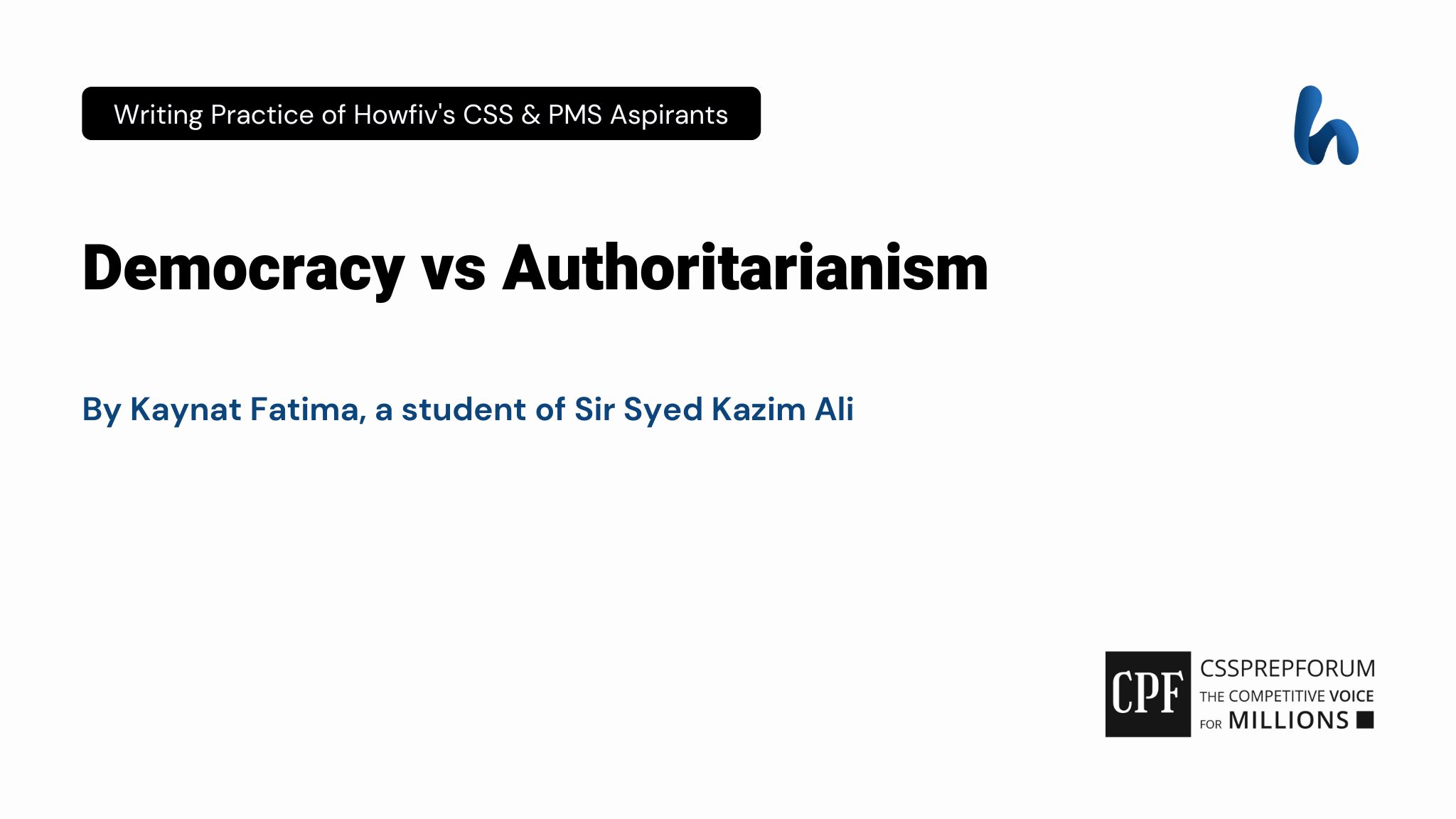
Top Categories
Cssprepforum, education company.

cssprepforum.com
Welcome to Cssprepforum, Pakistan’s largest learning management system (LMS) with millions of questions along with their logical explanations educating millions of learners, students, aspirants, teachers, professors, and parents preparing for a successful future.
Founder: Syed Kazim Ali Founded: 2020 Phone: +92-332-6105-842 +92-300-6322-446 Email: [email protected] Students Served: 10 Million Daily Learners: 50,000 Offered Courses: Visit Courses
More Courses

Basic English Grammar and Writing Course
Extensive English Essay & Precis Course for CSS and PMS

CSS English Essay and Precis Crash Course for 2023
Subscribe to our mailing list to receives daily updates direct to your inbox.

- CSS Solved Essays
- CSS Solved GSA
- CSS Solved PA
- CSS Solved Islamiat
- Current Affairs
- All Courses
- Writers Club
- All Authors
- All Members
- All Teachers
- Become an Author
- Who is Sir Syed Kazim Ali?
- Privacy Policy
CssPrepForum is Pakistan’s largest and greatest platform for CSS, PMS, FPSC, PPSC, SPSC, KPPSC, AJKPSC, BPSC, GBPSC, NTS, and other One Paper 100 Marks MCQs exams’ students. It has become Pakistan’s most trusted website among CSS, PMS students for their exams’ preparation because of its high-quality preparation material.
@ 2023 Cssprepforum. All RightsReserved.


Democracy & Illiteracy Do Not Move Together [CSS 2019]
Essay on the topic “Democracy & Illiteracy Do Not Move Together [CSS 2019]”
Democracy & Illiteracy Do Not Move Together
1. Introduction
- Democracy: definition and concept
- Illiteracy: definition and concept
2. Why democracy and illiteracy do not move together?
- Illiterate electorate elects undeserving candidates
- Illiteracy decreases voter turnout
- Illiterate politicians don’t let democracy deliver
- Illiterate rulers focus on short-sighted policies
- Illiteracy discourages the decentralisation of power and authority
- Illiteracy is an impediment to accountability
- Illiteracy keeps women (the half population) backwards and marginalized
- Illiteracy produces leadership of poor quality
- Illiteracy negatively impacts the transparency of the electoral process
- Illiteracy slows down the process of political evolution
3. Factors responsible for the prevalence of illiteracy
- Flawed policies
- Poor implementation of plans
- Budgetary constraints
- Overpopulation
- Social and cultural barriers
- Poverty and backwardness
- Bad governance and corruption
4. Recommendations for the elimination of illiteracy
- Devising of sharply focused policies
- Across-the-board implementation of plans
- Role of developed states in the provision of economic support
- Pragmatic policies for population control
- Awareness campaigns to eliminate social and cultural barriers
- Poverty-alleviation programmes
- Eradication of bad governance and corruption
5. Some other recommendations for the strengthening of democracy
- Effective role of media
- Hectic campaigns by the opinion-makers
- Fruitful role of UNO
- Protecting the rights and freedoms of individuals
- Strengthening democratic institutions
- Ensuring the rule of law
6. Conclusion
Democracy is a form of government in which the power is held by the people, either directly or through their elected representatives. In a democracy, the people have the right to participate in the decision-making processes of the government and to hold their leaders accountable for their actions. Illiteracy, on the other hand, refers to the inability to read and write. It is a problem that affects a significant portion of the world’s population and can have serious consequences for individuals and societies. It is generally understood that democracy and illiteracy do not go hand in hand, as an educated and informed citizenry is necessary for a functioning democracy. In order for people to be able to participate in the decision-making processes of their government and hold their leaders accountable, they need to be able to understand and evaluate the issues at hand. Illiteracy can prevent people from being able to do this, as they may not have the necessary skills to comprehend and analyze complex political issues.
Why democracy and illiteracy do not move together?
Illiterate electorate elects undeserving candidates: If a significant portion of the population is illiterate, they may not have access to information about the qualifications and positions of different candidates running for office. This can lead to the election of candidates who are not qualified or who do not represent the interests of the population.
Illiteracy decreases voter turnout: Illiteracy may also lead to a lower voter turnout, as individuals who cannot read or write may be less likely to participate in the electoral process. This can result in a smaller portion of the population having a say in who is elected to public office.
Illiterate politicians don’t let democracy deliver: If politicians are illiterate, they may not have the knowledge and skills necessary to effectively govern and implement policies that benefit their constituents. This can lead to a lack of progress and development in the community, and a failure of democracy to deliver on its promises.
Illiterate rulers focus on short-sighted policies: Illiterate rulers may also be more likely to focus on short-sighted policies that do not address long-term issues facing the community. They may be unable to understand and analyze complex issues, leading to a lack of comprehensive and effective policies.
Illiteracy discourages decentralisation of power and authority: In a democracy, it is important for power and authority to be decentralized and shared among different levels of government and among different groups within the community. However, if a significant portion of the population is illiterate, they may not have the knowledge and skills necessary to participate in the decision-making process and may be excluded from positions of power and authority. This can lead to a concentration of power and a lack of decentralization.
Illiteracy is an impediment to accountability: Illiteracy can also make it difficult for individuals to hold their government and elected officials accountable for their actions. If individuals cannot read or write, they may be unable to access information about the actions of their government and may be unable to effectively communicate their concerns and hold their representatives accountable.
Illiteracy keeps women (the half population) backward and marginalized: Illiteracy disproportionately affects women, as they are often denied access to education and face other barriers to learning. This can lead to a lack of representation and participation by women in the democratic process, and can result in policies and decisions that do not adequately address the needs and concerns of women.
Illiteracy produces leadership of poor quality: Illiteracy can also lead to a lack of qualified leaders, as individuals who are unable to read or write may not have the knowledge and skills necessary to effectively govern and make informed decisions. This can result in poor quality leadership and a lack of progress and development in the community.
Illiteracy negatively impacts the transparency of electoral process: Illiteracy can also make it more difficult for individuals to understand and participate in the electoral process, leading to a lack of transparency and accountability. This can undermine the integrity of the democratic process and discourage citizen participation.
Illiteracy slows down the process of political evolution: Finally, illiteracy can hinder the process of political evolution and progress, as it limits the ability of individuals to access information and engage in critical thinking about issues facing their community. This can lead to a lack of progress and development in the political system, and a failure to address the changing needs and concerns of the population.
READ: » Expanding Information Technology: Can be a Curse and a Blessing [CSS 2019]
Factors responsible for the prevalence of illiteracy
Flawed policies: One factor that can contribute to the prevalence of illiteracy is the existence of flawed education policies. If policies are not designed in a way that effectively promotes access to education and addresses the needs of disadvantaged groups, it can lead to a lack of progress in increasing literacy rates.
Poor implementation of plans: In addition to flawed policies, poor implementation of education plans and programs can also contribute to the prevalence of illiteracy. If resources are not allocated effectively or if there are gaps in the delivery of education services, it can prevent individuals from gaining the knowledge and skills they need to become literate.
Budgetary constraints: Budgetary constraints can also limit the ability of governments to invest in education and increase literacy rates. If there are insufficient resources available to fund education programs and initiatives, it can make it more difficult to provide access to quality education for all members of the community.
Overpopulation: In some cases, high population density can also contribute to the prevalence of illiteracy. If there are too many students for the available educational resources, it can lead to overcrowding in classrooms and a lack of individualized attention for students, which can hinder their learning and progress.
Social and cultural barriers: Social and cultural barriers can also contribute to illiteracy. For example, in some societies, there may be a stigma attached to education, particularly for girls and women. This can discourage individuals from seeking education and can limit access to educational resources.
Poverty and backwardness: Poverty and backwardness can also be major factors in the prevalence of illiteracy. If individuals are unable to afford the cost of education or do not have access to educational resources, it can prevent them from gaining the knowledge and skills they need to become literate.
Bad governance and corruption: Finally, bad governance and corruption can also contribute to the prevalence of illiteracy. If public officials are not committed to investing in education and promoting access to educational resources, it can hinder progress in increasing literacy rates. Corruption can also divert funds that could be used for education to other purposes, further limiting the availability of resources for education.
Recommendations for the elimination of illiteracy
Devising of sharply focused policies: One recommendation for the elimination of illiteracy is to devise sharply focused policies that address the specific needs and challenges facing the education system. This may include policies that promote access to education for disadvantaged groups, provide resources for teacher training and development, and invest in infrastructure and technology to support learning.
Across-the-board implementation of plans: In order to effectively eliminate illiteracy, it is important to ensure that education plans and programs are implemented consistently and effectively across the board. This may involve providing adequate funding and resources for education, training teachers and educators, and ensuring that all students have access to quality education.
Role of developed states in the provision of economic support: Developed states can play a significant role in the elimination of illiteracy by providing economic support to developing countries. This may include funding for education programs and initiatives, as well as technical assistance and expertise to help strengthen education systems and improve literacy rates.
Pragmatic policies for population control: In order to address the challenges of overpopulation and limited resources, it may be necessary to implement pragmatic population control policies. This could involve efforts to promote family planning and reproductive health, as well as policies that encourage economic growth and development, which can help to reduce poverty and improve access to education.
Awareness campaigns to eliminate social and cultural barriers: Awareness campaigns can also be effective in eliminating social and cultural barriers to education. This may involve efforts to change societal attitudes towards education and to promote the importance of education for both boys and girls.
Poverty-alleviation programs: Poverty can be a major barrier to education, particularly in developing countries. To address this issue, it may be necessary to implement poverty-alleviation programs that provide assistance to individuals and families living in poverty, such as cash transfer programs and employment initiatives.
Eradication of bad governance and corruption: Finally, efforts to eliminate illiteracy must also include efforts to eradicate bad governance and corruption. This may involve strengthening accountability and transparency in the education system, as well as efforts to combat corruption at all levels of government.
Some other recommendations for the strengthening of democracy
Hectic campaigns by the opinion-makers: Opinion-makers, such as community leaders, academics, and civil society organizations, can also play a role in strengthening democracy through their activism and advocacy efforts. They can use their platforms to raise awareness about important issues, promote democratic values and practices, and engage citizens in the democratic process.
Fruitful role of UNO: The United Nations (UN) can also contribute to the strengthening of democracy through its various programs and initiatives. For example, the UN may provide technical assistance and support to countries seeking to strengthen their democratic institutions, or it may advocate for the promotion of democratic values and practices globally.
Other recommendations for the strengthening of democracy may include:
Protecting the rights and freedoms of individuals: It is important for democratic societies to protect the rights and freedoms of individuals, including the right to freedom of expression, assembly, and association.
Promoting the participation of all members of society: In order for democracy to be effective, it is essential that all members of society are able to participate and have a say in the decisions that affect their lives. This may involve efforts to increase voter turnout, as well as efforts to ensure that marginalized groups are represented in the democratic process.
Strengthening democratic institutions: Strong democratic institutions, such as a free and fair electoral system, an independent judiciary, and accountable and transparent government, are essential for the functioning of a healthy democracy. Efforts to strengthen these institutions can help to promote stability and trust in the democratic process.
Ensuring the rule of law: It is also important for democratic societies to uphold the rule of law and to ensure that laws and policies are applied fairly and consistently. This can help to promote accountability and trust in the democratic process.
In a nutshell, democracy and illiteracy do not move together. In order for democracy to function effectively, it is essential that citizens are educated and informed, and able to participate in the democratic process. Illiteracy can limit access to information, decrease political participation, and hinder critical thinking skills, all of which can undermine the integrity of the democratic process. In order to promote democracy and eliminate illiteracy, it is necessary to implement policies and programs that promote access to education, address social and cultural barriers, and combat bad governance and corruption. By working together to eliminate illiteracy and strengthen democracy, we can create a more equitable and just society for all.
This is not the final draft of the essay on the topic “Expanding Information Technology: Can be a Curse Or a Blessing”. It may need further improvement. So, please let us know about your feedback on SeekerGK.com [ [email protected] ] or write in the box below that on which topic you want us to write an essay:)
For MCQs of all competitive exams, visit CSS MCQs
To Download Expanding Information Technology: Can be a Curse Or a Blessing in PDF Click below
You Might Also Like
Essay on “commercialization of education and its impacts on our society” [for css and pms], how can we avoid wwiii.

Different Religions of the world and Coronavirus

Status of Women in Islam (Islam and Women)
Css 2023 solved essay: “not all recycling projects are cost effective”.

Coronavirus disease (COVID-19) advice for the public (Basic Protective Measures)
China-pakistan economic corridor (cpec): challenges, opportunities and suggestions, css 2023 solved essay “instruction in youth is like engaging in stone.”, leave a reply cancel reply.
Save my name, email, and website in this browser for the next time I comment.
{{#message}}{{{message}}}{{/message}}{{^message}}Your submission failed. The server responded with {{status_text}} (code {{status_code}}). Please contact the developer of this form processor to improve this message. Learn More {{/message}}
{{#message}}{{{message}}}{{/message}}{{^message}}It appears your submission was successful. Even though the server responded OK, it is possible the submission was not processed. Please contact the developer of this form processor to improve this message. Learn More {{/message}}
Submitting…
- Privacy Policy
- Our Authors
- Subscribe Us
- Google Plus


Democracy and Illiteracy Cannot go Together (Hand written Essay PDF Download)
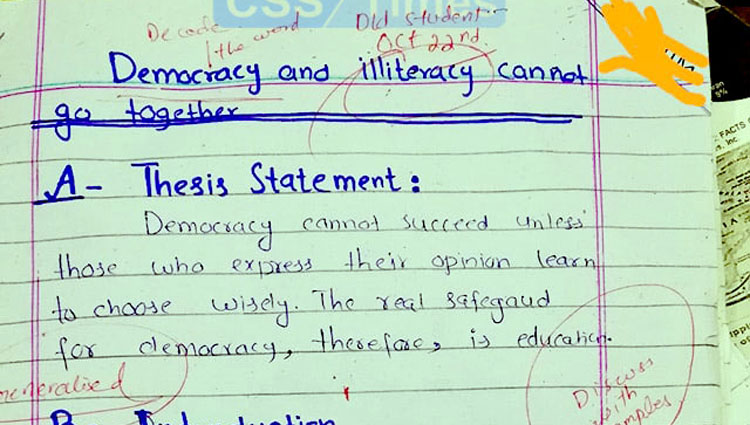
Essay on Democracy and Illiteracy Cannot go Together
(hand written essay pdf download).

Democracy which postulate enlightenment, is, by and large a blessing and illiteracy, which implies ignorance, is a menace.
How can both coexist? Democracy assumes that there is high degree of political consciousness among the public, a fair degree of intelligence and education, and adequate amount of knowledge about public affairs, high regard for national interest and sense of good citizenship.
Not less important tolerance dissert and civilized manner to defuse differences. People have high marks to accept the verdict of majority without threating to topple democratic system or to questions its credibility.
For all the above qualities, education is indispensable. Where there is no education the chances of success for democratic setup does not exist. Forget even a democratic setup, in an ignorant society none of the practical political setup could sustain.
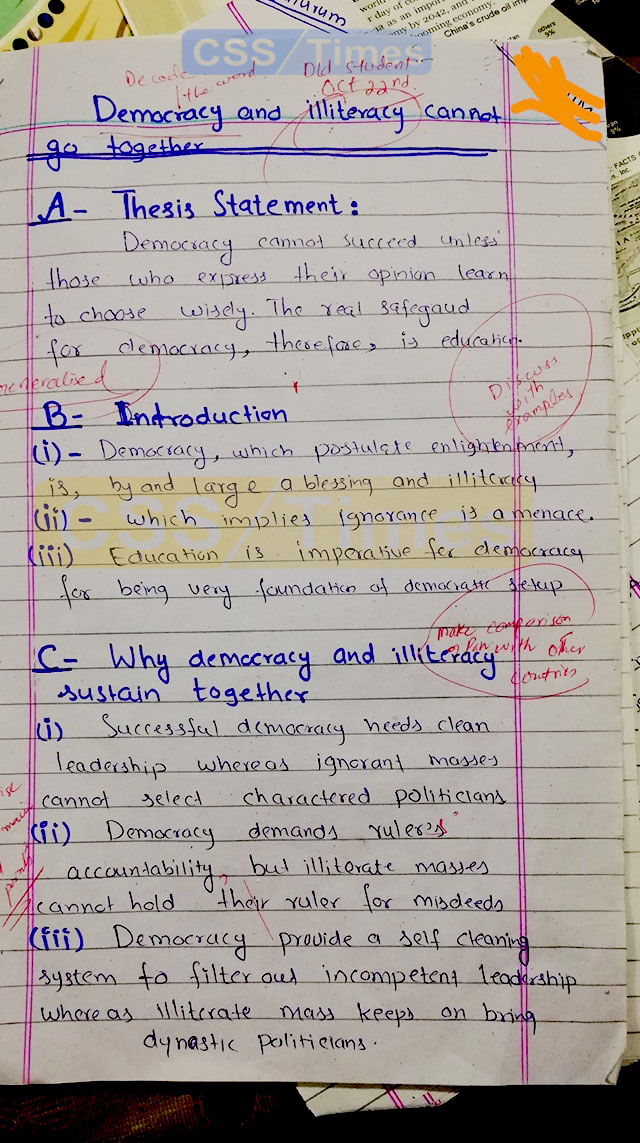
About the author

Shahzad Faisal Malik is the administrator of CSSTimes.pk and is responsible for managing the content, design, and overall direction of the blog. He has a strong background in Competitive Exams and is passionate and sharing information with others. Shahzad Faisal Malik has worked as a Graphic Designer/Content Creator at CSSTimes in the past. In his free time, Shahzad Faisal Malik enjoys watching Cricket, writing blogs for different websites and is always on the lookout for new and interesting content to share with the readers of this website. As the website administrator, Shahzad Faisal Malik is dedicated to providing high-quality content and fostering a welcoming and engaging community for readers. He looks forward to connecting with readers and hearing their thoughts and feedback on the website.
You may also like

Essay Outline: Electoral Reforms in Pakistan:...

Health for All | Essay Outline for CSS PMS

Exploring the Economic Potential of BRICS Countries:...

Art and Morality Essay Outline

Instruction in Youth is Like Engraving in Stone |...
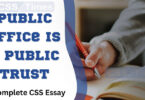
Public Office is a Public Trust | Complete CSS Essay
Leave a comment x.
[…] Democracy and Illiteracy Cannot go Together (Hand written Essay PDF Download) […]

Democracy and Illiteracy Don’t Move Together
- Essays, Outlines
- Oct 21, 2022
- Noshin Bashir

Table of Contents
1. Introduction
Democracy and illiteracy are two concepts that have a complex relationship, and it can be argued that they don’t inevitably move together. Democracy is a political system that promotes the participation of citizens in decision-making, whilst illiteracy refers to the inability to read and write. Along with peace, hunger and disease, illiteracy is another a deep-rooted problem which remains a long way from being solved despite huge investments from government. Illiteracy has another contradictory point concerning to democracy which is its tendency to promote centralized control of power & authority. Illiteracy elicits & supports class disparities by holding the power & authority confined to a few hands only – and this thing kills the spirit of democracy.
2. Challenges of Illiteracy in Democracy:
Illiteracy can pose challenges to democracy as it may limit the ability of people to fully participate in the democratic process. In a democratic society, citizens are probable to engage in critical thinking, make informed decisions, and participate in discussions and debates. However, illiteracy can inhibit these abilities, as it can limit access to information, restrict the understanding of complex issues, and hinder effective communication. Illiterate citizens may confront troubles in understanding political candidates, evaluating policies, or engaging in debates, which can result in reduced participation in elections or decision-making processes. Before moving forward, let’s find out the various forms of democracy and illiteracy:
3. Various Forms of Democracy
- Direct democracy: Direct democracy is a system in which citizens directly participate in decision-making and policy formation without elected representatives, allowing for direct and immediate influence over laws and policies.
- Representative democracy: Representative democracy is a system in which citizens elect representatives to make decisions and enact policies on their behalf, based on the principle of indirect participation.
- Constitutional democracy: Constitutional democracy is a system of government in which the powers of the government are defined, limited, and regulated by a constitution, with an emphasis on protecting individual rights and upholding the rule of law.
- Monitory democracy: Monitory democracy is a concept that refers to a form of democracy in which non-elected institutions or organizations, such as civil society groups, media, and watchdog organizations, play a significant role in monitoring and holding the government and elected officials accountable for their actions and decisions.
4. Basic Types of Illiteracy
- Functional illiteracy: Incompetence in such basic functions as reading, writing, and mathematics.
- Cultural illiteracy: Lack of basic information needed to thrive in the modern world.
- Moral illiteracy: Absence of moral and religious values from educational institutions.
- Healthcare illiteracy: Inability to comprehend and use necessary medical information.
Now we understand the basic types of democracy and illiteracy, now deep down the challenges of illiteracy in democracy.
5. Facts That Prove That Democracy and Illiteracy Do Not Move Together
Various facts represent the reality that democracy and illiteracy and democracy don’t move together. Some of them are:
- Illiterate voters elect unsuitable political candidates as leaders
- Illiteracy favors low voters’ turnout
- Illiterate politicians don’t respect the democratic rights of people
- Illiteracy leads to a short-sighted approach in decision-making circles
- Illiteracy discourages devolution of power and authority
- Illiteracy leads to poor political accountability
- Illiteracy assents backwardness and marginalization of women
- Illiteracy leads to the unskilled labor force
- Illiteracy discourages the process of political evolution
- Illiterate masses do not demand transparency in Govt. affairs
- Illiterate people don’t raise voice against injustices in society
- Illiteracy favors gender bias and results in inequality
- Illiteracy promotes extremism resulting in a dangerous atmosphere for minorities
- Illiterate people are more vulnerable to the health crisis
- Illiteracy discourages technological advancements
- Illiteracy gives space to a social crisis like unplanned population growth, drug abuse, unemployment, and economic deprivation
- Illiteracy doesn’t approve of political harmony and widens the class divide
6. Factors Responsible for The Widespread Prevalence of the Menace of Illiteracy
Several factors responsible for the widespread prevalence of the menace of illiteracy. Some of them are listed below:
- The flawed approach in policy making
- Poor implementation of social development plans
- Budgetary constraints
- Population explosion
- War-mongering and terrorism
- Stereotypical beliefs
- Cultural barriers
- Shortages of financial resources
- No preference for education
- Corruption and lack of meritocracy
7. Recommendations for Increasing the Literacy that Leads to Stronger Democracy
Some of the recommendations of increasing literacy rate are:
- Devising sharply focused policies
- Prioritizing education sector
- The proactive role of mainstream and social media
- Encouraging women participation in different fields
- Motivating and sensitizing the parents about the importance of education
- Financial and social support for poor children
- Educating the people about their basic political and constitutional rights
- Removal of religious, racial, and class-based discrimination
- Role of developed states and international forums in improving the literacy rates
- Awareness campaigns to eliminate social and cultural barriers about girls’ education
- Poverty-alleviation programs
- Provision of qualitative and technological skills to youth
- Eradication of bad governance and corruption
You Can Also Read: Classrooms Decide The Future Of The Nation
Share This Post:
Related posts.
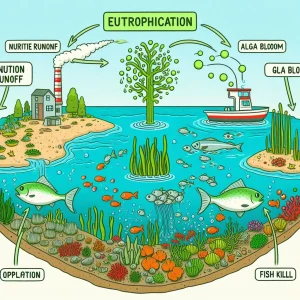
What is Eutrophication?

Indus River
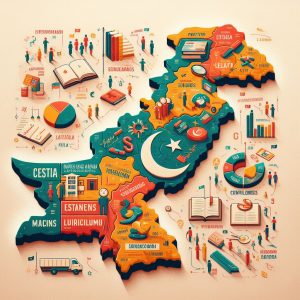
Education System in Pakistan
Matric paper of english bise sargodha, recent posts.
![democracy and illiteracy cannot move together css essay Artificial Intelligence [AI]](https://globaleak.com/wp-content/uploads/2024/03/Artificial-Intelligence-AI-300x300.webp)
Advantages and Disadvantages of Artificial Intelligence [AI]
Leave a comment cancel reply.
Your email address will not be published. Required fields are marked *
Save my name, email, and website in this browser for the next time I comment.
- Beginner's Guide
- Past Papers
- CSP Members
- Members List
- Social Groups
- Mark Forums Read

COMMENTS
Abeera Fatima, a student of Sir Syed Kazim Ali, has attempted the CSS 2019 essay " Democracy and Illiteracy Do Not Move Together " on the given pattern, which Sir Syed Kazim Ali teaches his students. Sir Syed Kazim Ali has been Pakistan's top English writing and CSS, PMS essay and precis coach with the highest success rate of his students.
In a nutshell, democracy and illiteracy do not move together. In order for democracy to function effectively, it is essential that citizens are educated and informed, and able to participate in the democratic process. Illiteracy can limit access to information, decrease political participation, and hinder critical thinking skills, all of which ...
C- Facts which prove that democracy and illiteracy cannot move together. Illierate population cannot choose visionary and capable leaders. Illiterate populace cannot hold leaders accountable for their failure to perform. Illiteracy entrenches feudal norms and suppresses liberties. Illiterate population provides a fertile ground for dictatorship.
1. Wednesday, November 17, 2010 02:08 AM. Outline 1. Introduction Thesis: Democracy and illiteracy do not move together because uneducated people cannot develop democratic culture in their conscience which disrupts democratic process. 2. Why.
this lecture, I have shared CSS 2019 solved Essay titled as Democracy and illiteracy do not move together concomitant with a methodology which you can adopt ...
The fact that democracy and illiteracy cannot move together can also be proved by having a glance at the economic conditions of the states riddled with the evil of illiteracy. Poverty, unemployment and backwardness: this is what illiteracy brings whenever and wherever it prevails. ... CSS Papers 2021. CSS Video Counselling . Website Statistics.
Democracy assumes that there is high degree of political consciousness among the public, a fair degree of intelligence and education, and adequate amount of knowledge about public affairs, high regard for national interest and sense of good citizenship. Not less important tolerance dissert and civilized manner to defuse differences.
CSS Essay Outline | Democracy and Illiteracy Do Not Move Together. Downloaded from csstimes | 1. Democracy and Illiteracy Do Not Move Together Main Outline. A- Introduction. B- Basic Tenets of Democracy. C- Facts which prove that democracy and illiteracy cannot move together. Illierate population cannot choose visionary and capable leaders
Democracy and illiteracy are two concepts that have a complex relationship, and it can be argued that they don't inevitably move together. Democracy is a political system that promotes the participation of citizens in decision-making, whilst illiteracy refers to the inability to read and write. Along with peace, hunger and disease, illiteracy ...
CSS Essay Outline _ Democracy and Illiteracy Do Not Move Together.pdf - Free download as PDF File (.pdf), Text File (.txt) or read online for free.
This essay will let you know about that how democracy and illiteracy cannot move together. How they both are contradicting with each other. Watch full video ...
Democracy progressively nourishes in the lap of literacy. Democracy without literacy is like the vehicle without wheels. Democracy is the government of the people, by the people, for the people. In this system, people drive the government with the potent of literacy. But illiteracy jams the wheels and derailed the democracy out of the way.
Essay outlines for the learner's to prepare outstanding essays for their exams. It's main purpose that you have to search the details of these outlines in yo...
CSS 2019 Essay Outline: Democracy and illiteracy do not move together. Written by: Asim Raza (38th CTP, PAS)
DEMOCRACY AND ILLITERACY CANNOT GO HAND IN HAND. Outline. 1 - Introduction Democracy, in the absence of literacy, a wild goose chase o Authoritarianism, feudalism- a sprout of illiteracy o Democratic norms annihilation in the presence of the lack of education o Illiteracy proven to be an obstacle to democracy in Pakistan o People not able to hold leaders accountable in the country
#CSS2022 #currentaffairs #englishessay #importantTopics #spsc #fpsc #muncipalofficer #townofficer In this video, the outline of the essay with a cursory glan...
CSS Essay Outline | Democracy and Illiteracy Do Not Move Together Downloaded from www.csstimes.pk | 3 Persistent want of Political will Inadequate budgetary allocations Regressive cultural norms The ghost of Gender inequality Persistently prevailing poverty E- Recommendations for proliferation of literacy leading to stronger democracy Enhacement of GDP spending on Education 1.
Outline. Democracy is rule of the masses, and it will succeed only if the masses are educated. 1.democracy requires honest and competent political leadership, whereas ignorant masses cannot choose the right men. 2.in an illiterate society, the masses and the rulers don not practise democratic norms and values.
D) Factors that increase illiteracy under democracy: 1) lack of political will. 2) no interest of judiciary. 3) lack of infrastructure. 4) phantom schools and teachers. 5) patriarchal society. 6) religious manipulation. 7) low budget. E)Way forward to strengthen democray and uplift education :
Democracy is the form of government where masses rule over the country indirectly by electing their leadership, and it will only succeed if the people are aw...
Democracy and Illiteracy Cannot Move Together | PDF | Democracy | Political Ideologies. democracy - Free download as Word Doc (.doc / .docx), PDF File (.pdf), Text File (.txt) or read online for free. This is an essay about the democracy.
democracy and illiteracy cannot move together,democracy and illiteracy do not move together,democracy and illiteracy will not move together,democracy and ill...